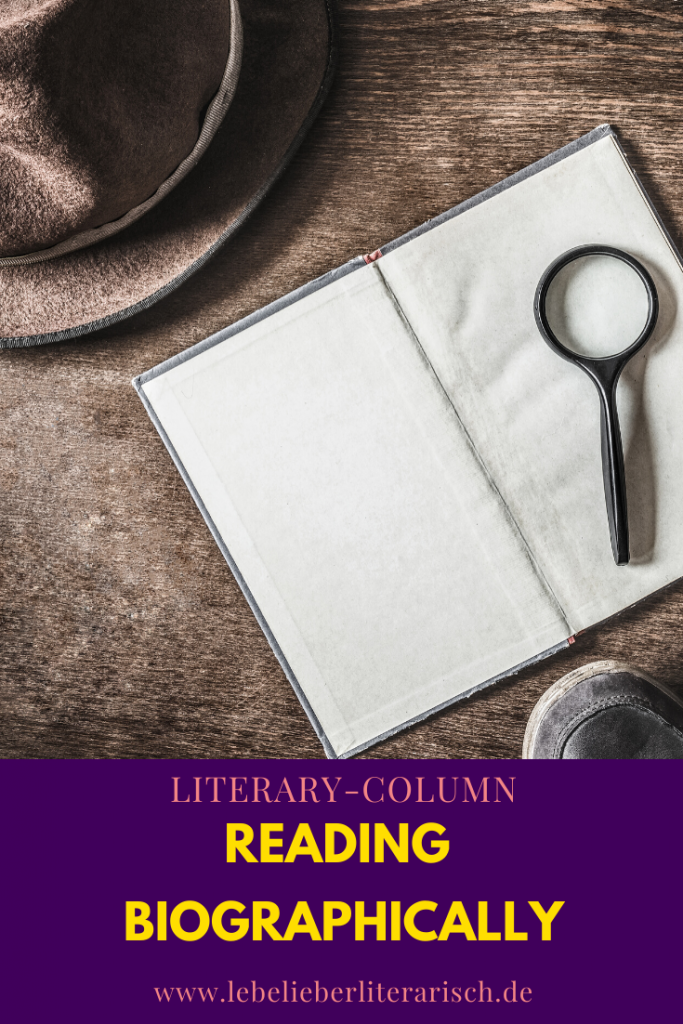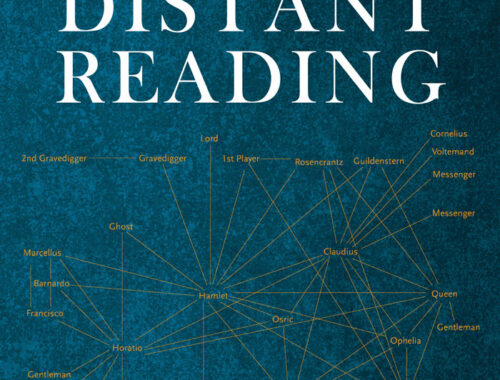
Reading biographically
Inhalt / Content
In literary studies it is a little frowned upon to read biographically. In the book trade one can hardly escape the advertising factor of biographically coloured stories. But what’s actually against it? And why is it sometimes difficult to get rid of it yourself? These are the questions I would like to explore a little more closely today.
What does biographical reading mean?
Reading a text biographically means, first of all, to place it in close relation to the life story of the author. This can trigger a tingling reality effect in us à la “oh my God, it’s all true”. But I don’t want to write about that today, because I already have written another blog article about it. But this can also – and this is what I want to talk about today – become a principle of analysis. This is the case, for example, when I, as a literary scholar, assume that a writer would process a certain trauma in his work. Since I have often spoken about this here, let us take Nietzsche. So, if I were to claim (which of course I wouldn’t do, but more on that later) that Nietzsche had completely changed his writing style from early works like “Menschliches allzu Menschliches” to the Zarathustra texts because Lou Andreas-Salomé did not want to marry him, that would be a biographical hypothesis. Or the other way around: The works of a writer become more and more crazy in the course of his life, so I’ll put forward the hypothesis that he was suffering from syphilis. This is also somehow a biographical statement. For I am inferring here from the work directly to details from the author’s life.
Why should we not read biographically?
Two short texts were published in 1968 and 69, which have since spoiled biographical reading for us literary scholars. The first is by Barthes and is called “the death of the author” (Barthes, 2005). The second is by Foucault and is called “What is an author?” (Foucault, 1988). Both conclude that the interest should be in the work. Barthes does not necessarily see this work as the creation of an authoritarian instance. The writing process is too intangible, too complex and the resulting text is a permeable concept. Foucault writes in his text that the work would kill its creator. It should make him immortal, but it does the opposite.
And if we now, surely to Foucault’s displeasure, bring in a few thoughts of his favorite enemy Sartre, we can think a step further. For, entirely in keeping with his idea that hell is others (Sartre, 1987), who judge people by their own deeds, the literary text is a perpetual occasion to torment the author with biographical conclusions (I’ll just say “syphilis”). And well, well, who knows, perhaps Foucault and Sartre are looking out of the window of their room in hell together right now, as in the play “closed society”, and each of them is thinking for himself: “Oh no, what is she writing, I knew it! It’s hell!”
And what if authors almost force us to do it?
I have to change the subject a bit abruptly now, but I promise we will come back to this point. I was recently asked to give an interview on Deutschlandradio Kultur on the subject of muses. The reason was that a biopic about Lou Andreas-Salomé was to be broadcast on Arte. Afterwards, my team colleague from the Coding Gender Hackathon wrote me a note and we exchanged about what we were reading at the moment, because the topic is currently occupying us both. And she told me that she had just read Frieda von Bülow’s “Novellas about Lou Andreas-Salomé and other women” (Bülow, 2011). A collection of stories that I – and here it comes – also wanted to read to learn more about Lou Andreas-Salomé. Bam, so I had landed in the trap. I had planned to read biographically…

A collection of novellas, which invites you to read biographically
But honestly, “Novellas about Lou Andreas-Salomé and other women”? The title really challenges it. And then the stories in it have titles like “two people”. Not like “My BFF Lou and Me.” So while the title of the collection promises something biographical, the novellas titles rather suggest fiction. And that’s an unbeatable combination, right? Who doesn’t feel a criminalistic instinct awakening in them? So one deliberately goes for a walk in the forest of fiction in order to find the very forest in which Lou and Frieda had a heated discussion.
A novel that does the same thing
Another example that works just as well is provided by Andreas-Salomé herself. For in her life review she cleverly intersperses hints that in her novel “The House” (Andreas-Salomé, 1987), which I am currently reading by the way, she has included personalities from her circle of friends as characters. She has portrayed Rilke in a young man and even, with his consent, used a passage from a letter from the poet to her. And indeed, one believes to have quickly found the young man. The tender mind, the psychological instability, even a poet must be exactly this figure. One can’t help but lapse into biographical reading, can one?
Fictions, fictional authors and very real people
You could now form a Rilke picture based on this novel, for example. Or you can form a personality of Lou Andreas-Salomé according to von Bülow’s novellas. But what good does that actually do us? These authors are literally dead and everything we think about their personalities today is necessarily mere fiction. And that is also what Barthes and Foucault, in my opinion, urge us to do with their texts. That we become aware that we don’t have the keys to the “true Rilke” to the “true Lou Andreas-Salomé” in our hands, but only fictions. That is why texts do not keep their authors alive. They merely create a projection surface for a presumed personality. The historical personality is replaced by this one and thus – for the second time and this time for real – killed.
Back again to the hell of the others
No wonder, by the way, that Foucault did not think much of Sartre’s theories. For while he still seems to have had the hope of spreading an awareness with his texts that the text and the author cannot be lumped together, Sartre seems to be rather pessimistic about this. With his play “Huis Clos” (Sartre, 1987) and his ideas on insincerity (mouvaise foi) (Sartre, 1993), he seems to be constantly warning: they will do it after all! They will judge! The only way to avert the hell of others is absolute sincerity towards oneself and others.
What really counts
Ok, in conclusion I would like to get away from the misery of the author who is interpreted and evaluated through his work. Because a perhaps more important question is, what is the point of reading biographically? There can be a brief authenticity effect, which is quite nice. But in the end we just don’t get any further than to authors who, in the worst (and in literary studies unfortunately most often) case, are already dead. It is much more interesting to look at the universal instead of the individual traits of a personality. It is much more interesting to focus on questions that relate what is portrayed to our own life-world. Is it important, for example, that writers themselves have experienced what they write about? Is it important that they bring authentic life into their literature? No, actually the only important thing is that they portray humans in all their facets. That way their texts become psychologically dense and timeless, and so texts written hundreds of years ago can still seem meaningful to us today. Or what do you think?
Translated with www.DeepL.com/Translator (free version)
References
- Andreas-Salomé, L. (1987) Das Haus. Frankfurt am Main/Berlin: Ullstein.
- Barthes, R. (2005) ‘Der Tod des Autors’, in Das Rauschen der Sprache. Frankfurt am Main: Suhrkamp, pp. 57–63.
- Bülow, F. von (2011) Die schönsten Novellen über Lou Andreas-Salomé und andere Frauen. Hamburg: Tredition.
- Foucault, M. (1988) ‘Was ist ein Autor?’, in Schriften zur Literatur. Frankfurt am Main: Suhrkamp, pp. 7–31.
- Sartre, J. P. (1987) Geschlossene Gesellschaft. Reinbek: Rowohlt.
- Sartre, J. P. (1993) Das Sein und das Nichts. Reinbek: Rowohlt.
You May Also Like

CALL FOR BLOGPOSTS ON THE TOPIC “COLORS OF DH”
July 30, 2020
Blog and podcast, a dream team for digital teaching?
November 19, 2020

